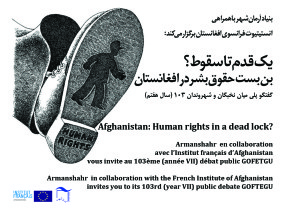Armanshahr’s 103rd Goftegu public debate was held with the title of “One step to collapse? Human rights in deadlock in Afghanistan” in the French Institute on 7 February 2013. This public meeting coincided with the publication of a report by Human Rights Watch titled “Rights at Risk as Military Drawdown Advances” and publication of three new books by Armanshahr: “Human Rights at Crossroads, a joint report of International Federation for Human Rights and Armanshahr Foundation”; “Prison, prisoners and human rights: Politis asia 12-13”; and “War and the city: Politis asia 14-15.”
Speakers of the meeting included Ms Heather Barr (HRW researcher in Afghanistan), Mr Ahmad Behzad (Member of Parliament), Mr Seyyed Omar Sabour (Deputy minister of interior for gender, human rights and children) and Mr Azaryoun Matin (executive director of Human Rights Focus Organisation).
Ms Heather Barr said in her address: We criticised the Taleban’s operations in 2012 for attacking the civilians. They used children in suicide attacks and violated women’s rights. They executed a woman in Parwan province. Civilians are also killed in night raids by ISAF and American forces. The American troops ill treated the prisoners at Bagram. The Afghan local police have also committed abuses.
Mr Sabour, the deputy interior minister said: Our cities and the foundation of our country were destroyed in 30 years of war. A country that has been destroyed in the course of 40 years cannot be reconstructed in 10 years. Afghanistan is like a 10 year-old child who still needs help. This is a war imposed in Afghanistan. The world is living in peace but the people of Afghanistan are sacrificed. Insecurity is rampant nationwide. Why do they not try the suicide attackers in international courts?
He went on: There are 500 human rights activists in the ranks of the police and the police brings to justice its members as well as all other detainees.
He did not mention the number of the police who have been detained for human rights abuses, but he argued that the lack of a law to ban torture is one of the problems that prevents an end to torture.
In the opinion of Mr Sabour, the poor economic conditions of the families, absence of the rule of law, unemployment, and the failure to make proper use of mines, agriculture and industry are the reasons for the increased violence.
Mr Behzad, MP for Herat, referred to the achievements in the past 10 years and raised his question: how can we retain those achievements?
In his opinion, Afghanistan is a country with the most people inclined to leave. Offenders are not prosecuted; only 20 from 100 offenders are detained; out of those 20, two are interrogated and they are defenceless people.
He asked: if government officials, prosecutors and courts do not comply with the law, how can we expect the common people to comply with the law? If nobody listens to the people, they will take action by different means.
Criticising the people, the government and other countries, he asserted: Our society is not healthy. Human rights can be implemented in a healthy society; in a sick society, everybody will be infected. We are a society plagued with despotism. We do not respect humanity and we would be excommunicated if we criticised. How many books are published in Afghanistan about human beings every year?
He argued: we are still subjects. The government does not see the people as citizens but as subjects. Torture does not prevail in prison only. The government forces people to live in caves; and such a government is torturer. Foreigners have given Afghanistan a lot of assistance, but the distribution policy was corrupt. More money was spent where there was more fighting.
Human rights activist Azaryoun Matin said: we will not progress towards democracy if the rights of the victims are ignored. Reconciliation between criminals will not lead to peace; reconciliation between criminals and victims shall lead to peace. Victims must be the focus of the peace process.
He explained: The First Bonn Conference did not shape a peace agreement, but a new coalition for war. The agreement was used by people who were accused of committing war crimes. In that year, thousands of the Taleban disappeared and gained the chance to shape a new war strategy.


